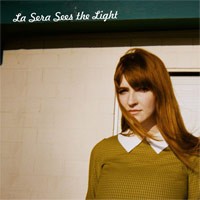
La Sera
Sees the Light (2012)
John Gentile
Be careful, boys, Katy Goodman is a dangerous woman. Although â¦Sees the Light, the second LP under her La Sera moniker, has its fair share of love songs, it's the breakup tunes that form the release's arc, bringing both an end to the LP as well as the subject relationship. But, while music has breakup songs aplenty, so rarely are the goodbyes delivered as sweetly and as kindly as they are here, molding her anger into a series of the unkindest cuts of all.
It's one thing to get dumped and be told by the breaking party that "I hate you because you cheated!" or "You never think of me!" Such admonitions exemplify value in the underlying relationship by indirectly stating that it's a person's flaws outshining his or her value that brought the termination. Further, in those types of relationships, such anger suggests great attachment. But here, Goodman dispatches sweetly and somewhat coldly, thereby adding an intriguing dynamic to the timeless breakup tune.
Throughout all the songs, (and goodbyes) Goodman never shouts or screams. Rather, she retains the sweet softness that backed up the Vivian Girls and acted as the foundation for the first La Sera LP. Immediately noticeable is how much Goodman has been focusing on her voice. While the first La Sera LP was wrapped in ethereal, sweet harmony, it was never clear if the soft sound came from Goodman or from analogue-style layering. But here, Goodman's voice is more direct and stronger. Her voice seems to cross scales with greater ease than before and comes across as a clear beam, instead of floating on clouds. On "Please Be My Third Eye," Goodman's voice soars over a new wavey cadence that seems to draw from early Blondie in all the right ways. On "Real Boy" there is a slight throwback to early girl groups, but also to the strength and delicate timbre of the '60s/'70s singers/songwriters such as Stevie Nicks and Nancy Sinatra.
Although it would probably be disingenuous to suggest that Goodman was influenced by her work on her recent Morrissey cover, Moz's distanced delivery seems to lurk around the edges. Goodman's soft voice rolls along with Rob Barboto's riffs that alternate between shimmering and driving early punk, and when the lyrics close, the music continues, causing Goodman to hum and coo along in harmony, which underlines both the music's melody as well as extending the feeling created by the lyrics, non-verbally.
But, while the distanced sweetness makes the breakups harsh, it's Goodman's lyrics that really sharpen the dagger. Instead of screaming "You were a jerk!" on "How Far We've Come Now," Goodman calculates "Gave it all another try / But I found out we're not worth saving." On "Love That's Gone," she calmly announces, without a hint of vitriol, "I wish you would see that you're not the one for me." In fact, as opposed to blaming the dumpee, she even admits that "I've done wrong" on three separate songs. Yet, Goodman's lack of personal attacks on the partner, and in their place, objective statements as to the relationship's end, seem to be the most harsh endings of all. She's not getting rid of the former beau because of something he did, she's dropping him because he didn't have, and never will. BROOTAL!
What makes Sees the Light so masterful is that it's an incredibly personal work, but the subjects aren't presented as a subjective "good" and "bad." Rather, it tells a story of two people that just couldn't get it to work--an objective, in depth observation of one's own experiences removed from the subjective anger. Let's hope that the success of this LP's execution will be of some compensation, no matter how small, to the guy that was annihilated by these sweet, but fatal, words.